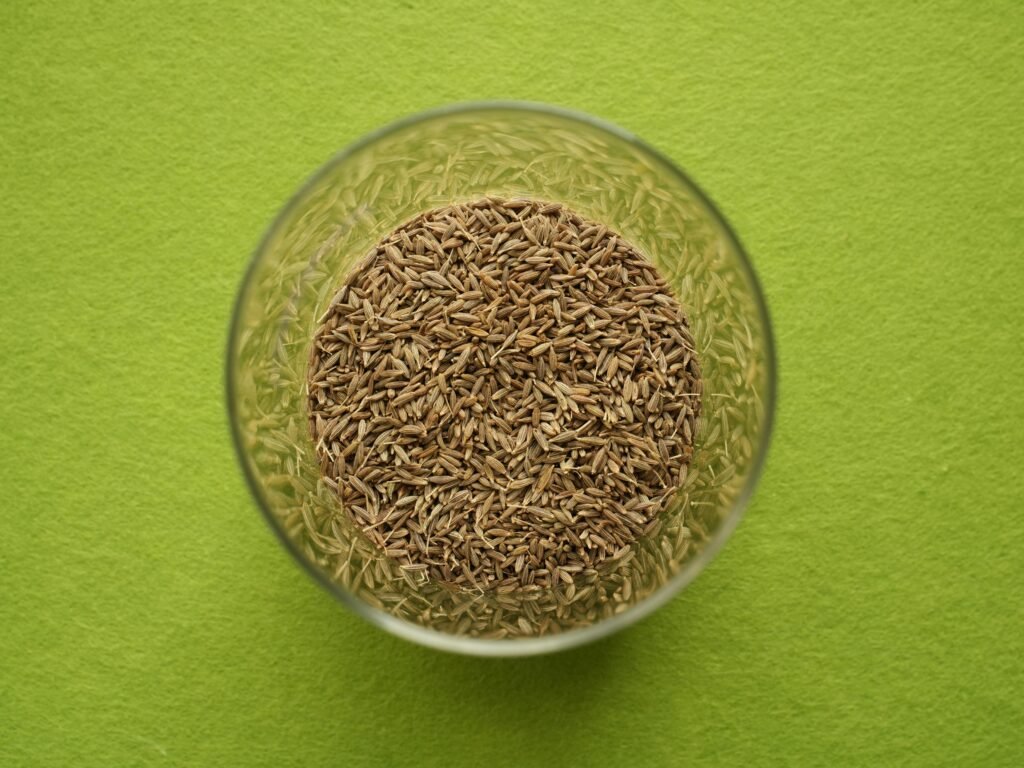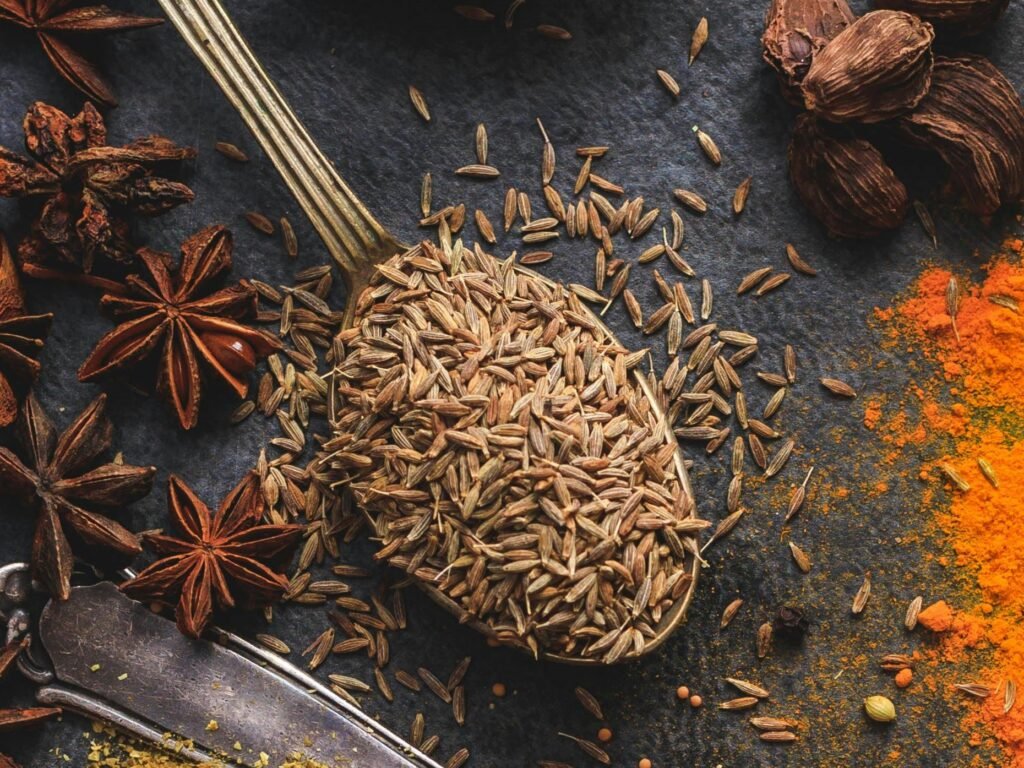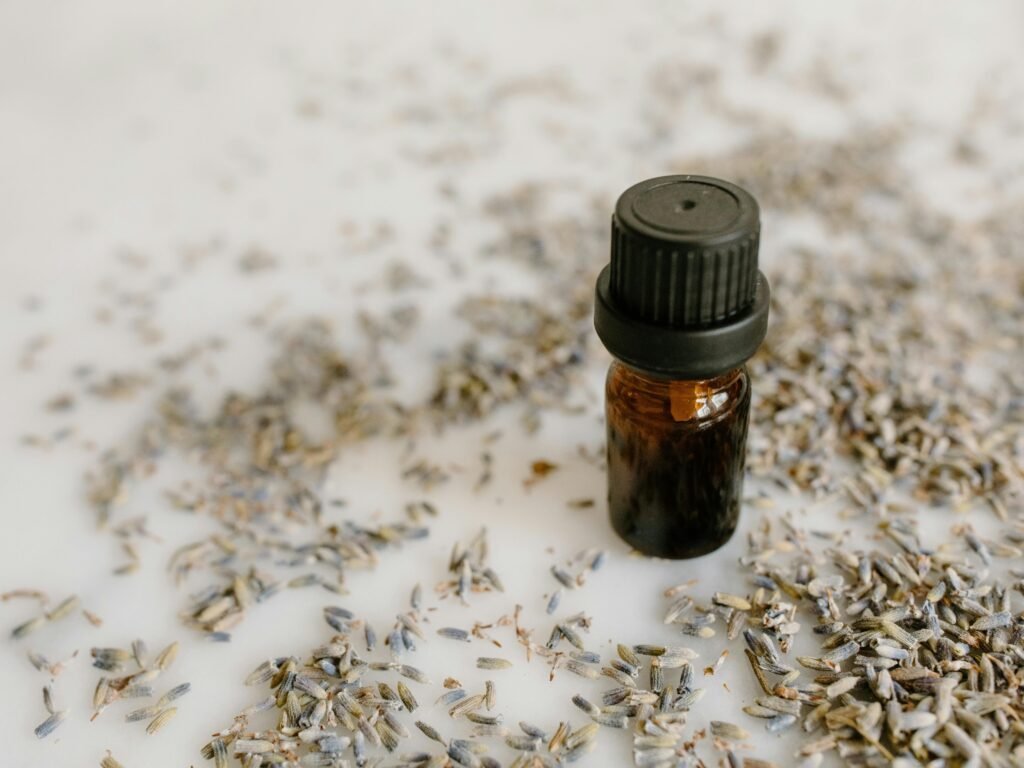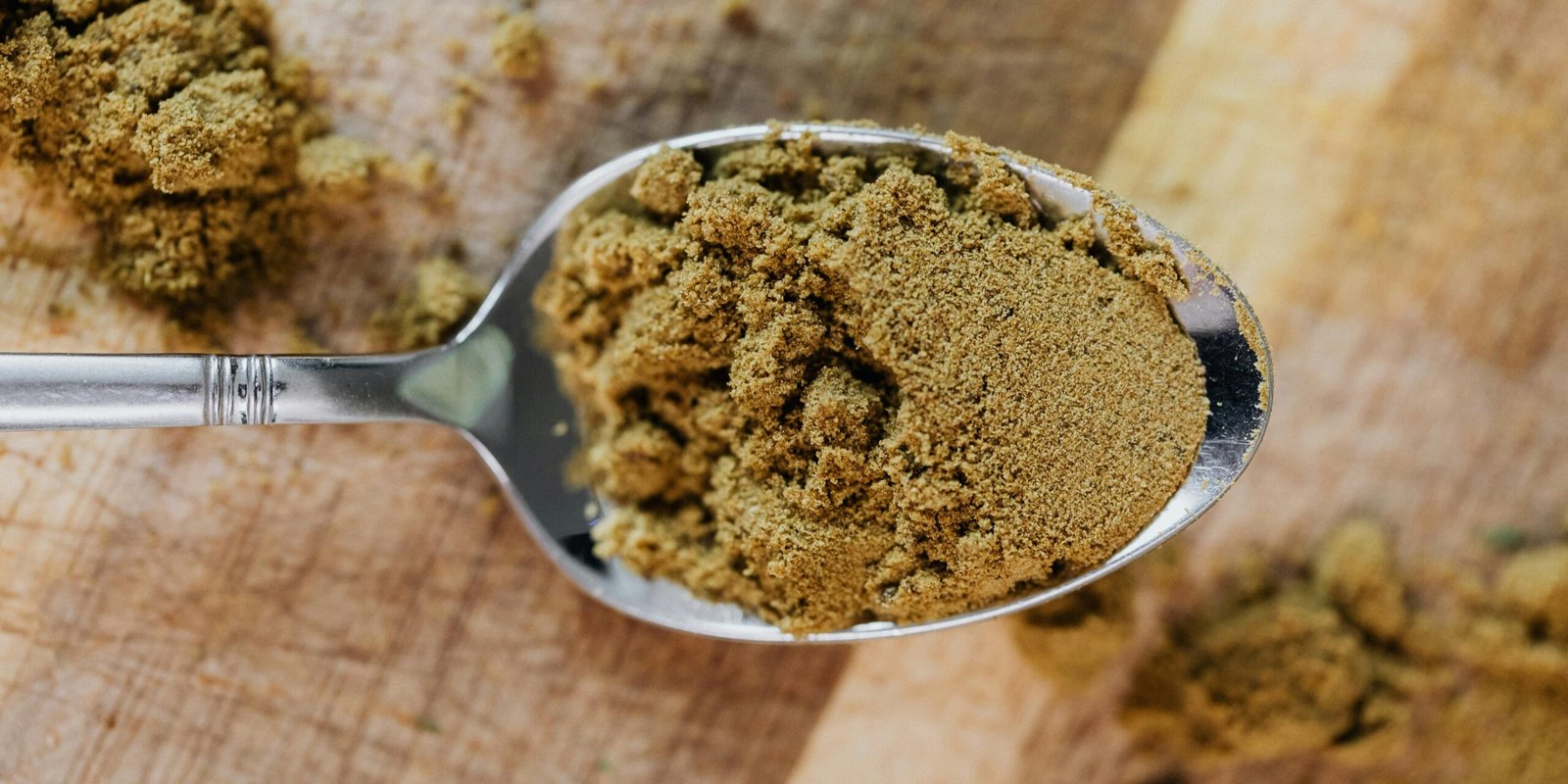Table of Contents
Cumin, with its warm and earthy flavour, has been cherished for centuries both as a culinary staple and a powerful medicinal herb. In this journey, we delve into the nutritional richness and therapeutic properties of cumin, uncovering its potential to enhance health and well-being. From its digestive benefits to its antioxidant and anti-inflammatory properties, cumin offers a wealth of reasons to make it a regular part of your diet. Join us as we unravel the secrets of cumin and discover how this humble spice can contribute to your overall health and vitality.
Cumin, scientifically known as Cuminum cyminum, has a fascinating origin deeply rooted in ancient history. Believed to have originated in the Mediterranean region or the Middle East, cumin has been cultivated and used for thousands of years. Its use dates back to ancient Egypt, where it was prized for both culinary and medicinal purposes. Cumin seeds were discovered in the tomb of Pharaoh Tutankhamun, highlighting their significance in Egyptian culture. From there, cumin spread throughout the ancient world, including to regions such as India, where it became a fundamental spice in Ayurvedic medicine and culinary traditions.
Today, cumin is cultivated in various countries across Asia, Africa, and the Mediterranean, with India being one of the largest producers. Its rich history and widespread use reflect the enduring popularity and importance of cumin in global cuisine and wellness practices.
NUTRITIONAL VALUE

Cumin seeds not only add a distinctive flavour to dishes but also offer a range of essential nutrients beneficial for health. These tiny seeds are rich in vitamins, minerals, and antioxidants. A tablespoon of whole cumin seeds provides approximately 22 calories and contains significant amounts of iron, manganese, calcium, magnesium, and phosphorus. Cumin seeds are also a good source of dietary fiber, providing about 1 gram per tablespoon. Additionally, cumin seeds contain various phytonutrients, including flavonoids and phenolic compounds, which possess antioxidant properties. These antioxidants help neutralize harmful free radicals, reducing oxidative stress and inflammation in the body.
Incorporating cumin seeds into your diet can contribute to overall health and well-being, supporting digestive health, immune function, and antioxidant defense systems. Whether used whole or ground, cumin seeds are a versatile and nutritious addition to a variety of culinary creations.
HEALTH BENEFITS

Cumin offers a range of health benefits, thanks to its rich nutritional profile and bioactive compounds. Here’s a detailed exploration of its potential health-promoting properties:
DIGESTIVE HEALTH
Cumin has long been used in traditional medicine to aid digestion and alleviate gastrointestinal discomfort. It stimulates the secretion of digestive enzymes, which helps break down food and improve nutrient absorption. Additionally, cumin may help relieve symptoms of indigestion, bloating, and gas.
ANTI-INFLAMMATORY EFFECTS
Cumin contains several anti-inflammatory compounds, including cuminaldehyde and thymol, which help reduce inflammation in the body. These compounds may help alleviate symptoms of inflammatory conditions such as arthritis, asthma, and inflammatory bowel diseases.
ANTI-OXIDANT ACTIVITY
Cumin is rich in antioxidants, including flavonoids and phenolic compounds, which help neutralize harmful free radicals and protect cells from oxidative damage. Regular consumption of cumin may help reduce the risk of chronic diseases such as heart disease, cancer, and neurodegenerative disorders.
BLOOD SUGAR REGULATION
Some studies suggest that cumin may help regulate blood sugar levels by improving insulin sensitivity and reducing insulin resistance. This makes it potentially beneficial for individuals with diabetes or those at risk of developing the condition.
HEART HEALTH SUPPORT
Cumin may help support heart health by reducing cholesterol levels and blood pressure. It contains compounds that inhibit the absorption of cholesterol in the intestines and promote its excretion from the body, potentially lowering LDL (bad) cholesterol levels. Additionally, cumin’s diuretic properties may help reduce blood pressure by promoting the elimination of excess fluid and sodium from the body.
IMMUNE SYSTEM BOOST
Cumin contains vitamin C and vitamin A, as well as other immune-boosting nutrients, which help strengthen the immune system and enhance its ability to fight off infections and illnesses. Regular consumption of cumin may help reduce the risk of common colds, flu, and other infectious diseases.
WEIGHT MANAGEMENT
Some research suggests that cumin may aid in weight loss and management by increasing metabolism and promoting fat breakdown. Additionally, cumin’s ability to improve digestion and reduce appetite may help prevent overeating and support weight loss efforts.
BONE HEALTH
Cumin is a good source of calcium, which is essential for bone health and strength. Calcium, along with other minerals found in cumin, helps maintain bone density and reduce the risk of osteoporosis and fractures.
ANTI-CANCER POTENTIAL
Preliminary studies suggest that cumin may have anti-cancer properties, including the ability to inhibit the growth and spread of cancer cells. Cumin’s antioxidant and anti-inflammatory effects may help protect against certain types of cancer, although more research is needed to confirm these findings.
RESPIRATORY HEALTH
Cumin’s anti-inflammatory properties may help alleviate symptoms of respiratory conditions such as asthma, bronchitis, and coughs. It may help reduce inflammation in the airways and promote easier breathing.
PRECAUTIONS

While cumin offers numerous health benefits, it’s essential to be aware of potential precautions and drawbacks associated with its consumption:
ALLERGIC REACTIONS
Although rare, some individuals may be allergic to cumin or develop allergic reactions upon exposure. Symptoms of cumin allergy may include skin rash, itching, swelling, or difficulty breathing. Individuals with known allergies to cumin or other members of the Apiaceae family (such as celery, carrots, or parsley) should avoid cumin or use it with caution to prevent allergic reactions.
GASTROINTESTINAL ISSUES
In some individuals, particularly those with sensitive stomachs or gastrointestinal conditions such as gastroesophageal reflux disease (GERD) or irritable bowel syndrome (IBS), consuming large amounts of cumin or cumin supplements may cause digestive discomfort, including nausea, bloating, or diarrhoea. It’s essential to listen to your body and consume cumin in moderation, especially if you experience digestive issues.
BLOOD SUGAR REGULATION
While cumin may help regulate blood sugar levels in some individuals, it may also interact with diabetes medications and affect blood sugar control. Therefore, individuals with diabetes or those taking medications to lower blood sugar should monitor their blood glucose levels closely when consuming cumin or cumin supplements and consult with their healthcare provider as needed.
PREGNANCY AND BREASTFEEDING
While cumin is generally considered safe when consumed in moderate amounts as a spice in food, there is limited research on its safety during pregnancy and breastfeeding. Pregnant or breastfeeding women should consult with their healthcare provider before using cumin supplements or consuming large amounts of cumin to ensure safety for themselves and their baby.
MEDICATION INTERACTIONS
Cumin may interact with certain medications, including blood thinners, diabetes medications, and medications metabolized by the liver. It can interfere with the effectiveness of these medications or exacerbate their side effects. Individuals taking medication should consult with their healthcare provider before using cumin supplements or significantly increasing cumin consumption.
OXALATE CONTENT
Cumin contains oxalates, compounds that can contribute to the formation of kidney stones in susceptible individuals. Consuming large amounts of cumin, especially in supplement form, may increase the risk of developing kidney stones, particularly in individuals with a history of kidney stones or kidney disease.
SKIN SENSITIVITY
Direct contact with cumin oil or cumin-based skincare products may cause skin irritation or allergic reactions in some individuals, particularly those with sensitive skin. It’s advisable to perform a patch test before using cumin topically and discontinue use if irritation occurs.
QUALITY AND PURITY CONCERNS
Some cumin products, particularly supplements or ground cumin powder, may be of poor quality or contaminated with impurities, including heavy metals and pesticides. To ensure safety and efficacy, it’s essential to choose high-quality, reputable brands when purchasing cumin supplements and to follow recommended dosages.
INCORPORATING CUMIN INTO YOUR DIET

Incorporating cumin into your diet is not only easy but also adds depth of flavour and a nutritional boost to your meals. Here are several creative and delicious ways to incorporate cumin into your daily cooking:
- Curries and Stews: Cumin is a staple ingredient in many curry dishes and stews. Add ground cumin or whole cumin seeds to your favourite curry recipes to enhance their flavour and aroma. Whether it’s a vegetable curry, chicken tikka masala, or lentil stew, cumin adds a warm and earthy undertone that complements the other spices in the dish.
- Rice and Grain Dishes: Sprinkle ground cumin over cooked rice, quinoa, or other grains to infuse them with flavour. Cumin pairs particularly well with rice dishes such as pilaf, biryani, or Mexican rice. You can also add cumin seeds to the cooking water when preparing rice or grains for added flavour.
- Roasted Vegetables: Toss your favourite vegetables in olive oil, sprinkle them with ground cumin, and roast them in the oven until tender and caramelized. Cumin adds a delicious savoury flavour to roasted vegetables such as carrots, cauliflower, sweet potatoes, and Brussels sprouts.
- Homemade Hummus: Add ground cumin to homemade hummus for an extra layer of flavour. Cumin enhances the earthy taste of chickpeas and complements the garlic and lemon flavours in the hummus. Serve with pita bread, crackers, or fresh vegetables for a tasty snack or appetizer.
- Grilled Meats and Fish: Create a flavourful marinade for grilled meats and fish by combining ground cumin with other spices, herbs, garlic, and olive oil. Cumin adds depth of flavour to grilled chicken, beef, lamb, and seafood, making them more delicious and aromatic.
- Bean Dishes: Add ground cumin to bean dishes such as chilli, bean soups, and bean salads for an extra boost of flavour. Cumin pairs well with beans and lentils, enhancing their natural taste and adding warmth to the dish.
- Eggs: Sprinkle ground cumin over scrambled eggs, omelettes, or frittatas for a flavourful breakfast or brunch option. Cumin adds a savoury kick to eggs and pairs well with other breakfast ingredients such as cheese, tomatoes, and herbs.
- Yoghurt Sauces and Dips: Mix ground cumin into yoghurt-based sauces and dips for added flavour. Cumin yogurt sauce is a popular condiment in Middle Eastern and Indian cuisine, often served with grilled meats, kebabs, or falafel.
- Baked Goods: Experiment with adding ground cumin to baked goods such as bread, savoury muffins, and crackers for a unique flavour twist. Cumin adds warmth and complexity to baked goods, making them more interesting and flavourful.
- Salad Dressings: Whisk ground cumin into homemade salad dressings along with olive oil, vinegar, lemon juice, garlic, and herbs. Cumin adds depth of flavour to salad dressings and pairs well with leafy greens, vegetables, and grains in salads.
In conclusion, cumin emerges as a powerhouse of flavour and health benefits, enriching both culinary creations and well-being. Its distinctive aroma and earthy taste have adorned dishes for centuries, while its medicinal properties have been revered across cultures and civilizations. From aiding digestion and reducing inflammation to supporting heart health and boosting immunity, cumin offers a wide array of potential health-promoting effects. However, it’s essential to consume cumin mindfully, considering individual sensitivities and potential interactions with medications. By incorporating cumin into your diet in various creative ways, you can harness its unique flavour and nutritional richness while reaping its many health benefits.
Let cumin become not only a staple in your spice rack but also a trusted ally in your journey toward a healthier, more vibrant life. Embrace the warmth and depth of cumin, and savour the goodness it brings to your health and culinary adventures.

